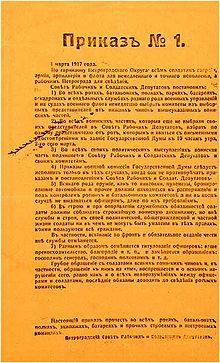Order No. 1 of the Petrograd Soviet
The no. 1 of the Petrograd Soviet command designates the first command after the February Revolution of 1917 to the garrison of the Petrograd Military District, issued on 1/ 14 March 1917 on the joint session of the workers 'and soldiers' section of the Petrograd Soviet .
The drafting of Order No. 1 was carried out by a commission elected by the Soviet and chaired by ND Sokolov . Order No. 1 gave the force of law to the soldiers' committees that were spontaneously formed in the Russian army . It implied that the troops are subordinate to the Soviet of Workers' and Soldiers' Deputies and the elected soldiers' committees in all political activities.
Orders given by the State Duma War Commission were only to be carried out if they did not contradict the orders and decisions of the Soviet. According to Order No. 1, weapons should be at the disposal and under the control of the company and battalion committees and under no circumstances should they be given to the officers .
At the same time the attempts of the Provisional Committee of the State Duma to restore the unrestricted power of the officers in the units were thwarted. Order No. 1 legalized the soldiers' committees, gave the soldiers civil rights, established their equality with the officers outside of the service and the hierarchy, forbade rude speeches to the soldiers and created the title (e.g. the salutation “Highly Born ") From.
The effectiveness of Order No. 1 went far beyond the boundaries of the capital garrison. He favored the "democratization" of the army and the organization of the mass of soldiers into an active force in the sense of the Soviet. However, Order No. 1 did not reflect the main demand of the soldiers, the eligibility of the army commanders.
This was an effect of the influence of the Social Revolutionaries and the Mensheviks . But regardless of this unfulfilled requirement of eligibility in Order No. 1, the soldiers of many units dismissed officers and elected their supporters to the command posts.
Source text: wording of Order No. 1 of the Petrograd Soviet
“March 1st (14th) 1917
To the Garrison of the Petrograd Military District! To all soldiers of the guard, the army, the artillery and the navy for immediate and precise execution, to the workers of Petrograd for your information!
The Soviet of Workers 'and Soldiers' Delegates has decided:
1. In all companies, battalions, regiments, batteries, squadrons, in all offices of the various military administrations as well as on the ships of the navy, committees are to be elected immediately from elected representatives of the teams of the troops listed above.
2. All troop units that have not yet elected their representatives in the Soviet of Workers' Delegates should elect one representative for each company. These representatives have to appear in the Duma building with a written confirmation on March 2nd (15th) at ten o'clock in the morning.
3. In all political affairs every unit of the troops is subordinate to the Soviet of Workers 'and Soldiers' Delegates and its committees.
4. The orders of the military commission of the State Duma are only to be carried out if they do not conflict with the orders and resolutions of the Soviet of Workers 'and Soldiers' Delegates.
5. All kinds of weapons, such as rifles, machine guns, armored cars, etc., must be in the hands and under the control of the company and battalion committees and must under no circumstances be handed over to officers, even if they so request.
6. In exercising their service, soldiers must adhere to the strictest military discipline, but outside of their service soldiers must in no way be adversely affected in their political, civil and private life in those rights which all other citizens enjoy. The off-duty military salute will be abolished.
7. Likewise, the title of officers: Excellency, Well-Born, etc., is abolished and replaced by phrases such as: Herr General, etc. Rough behavior, including using Duzen to the soldiers, is prohibited. The latter are obliged to inform their company committees of any violation of this order and of any misunderstanding between officers and soldiers.
This order is to be read out in all companies, battalions, regiments, batteries and other military units.
The Petrograd Soviet of Workers 'and Soldiers' Delegates. "
swell
- ↑ Source: The Russian Revolution 1917, Munich 1964, p. 133

